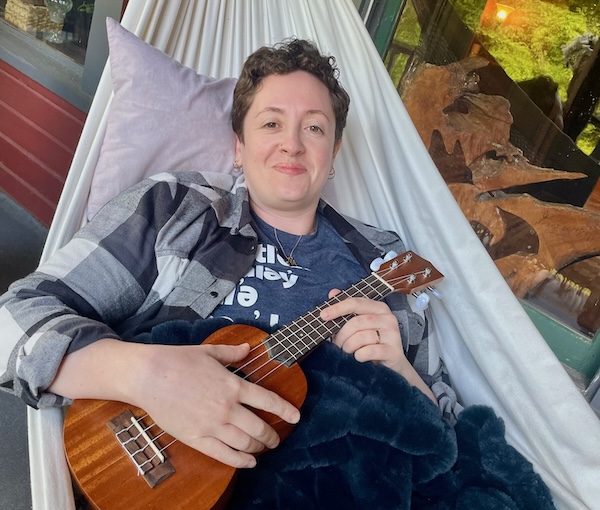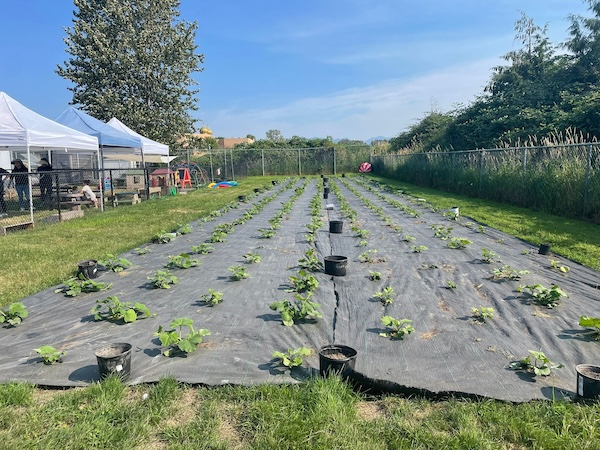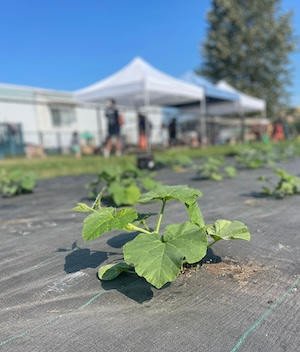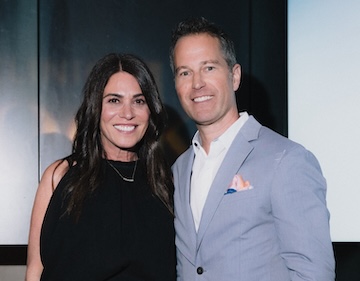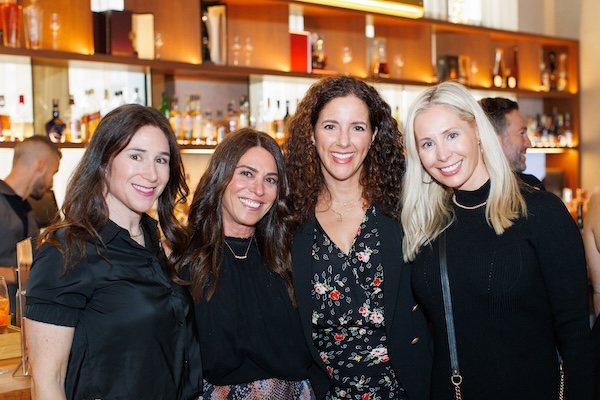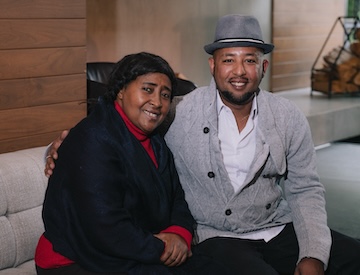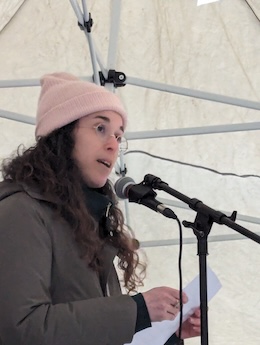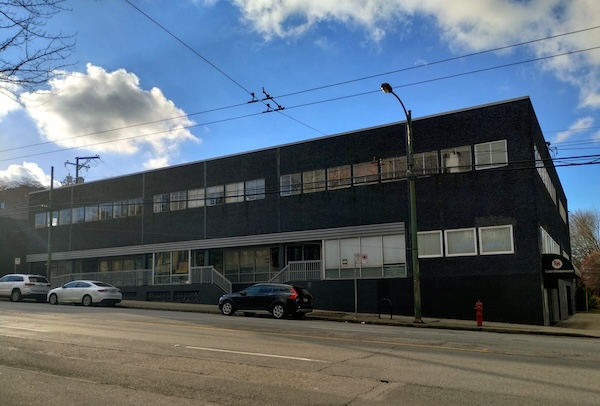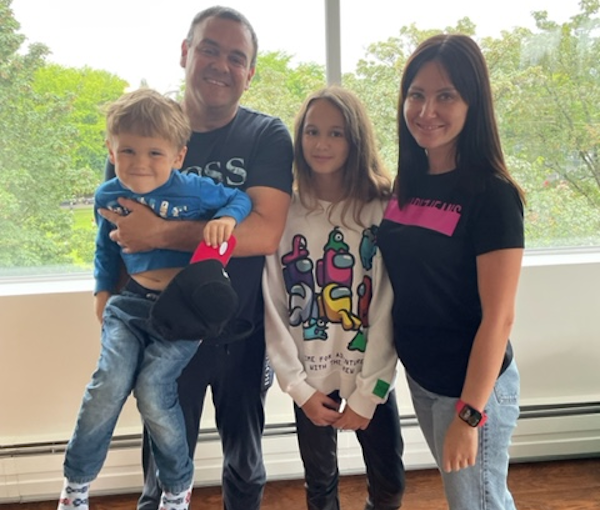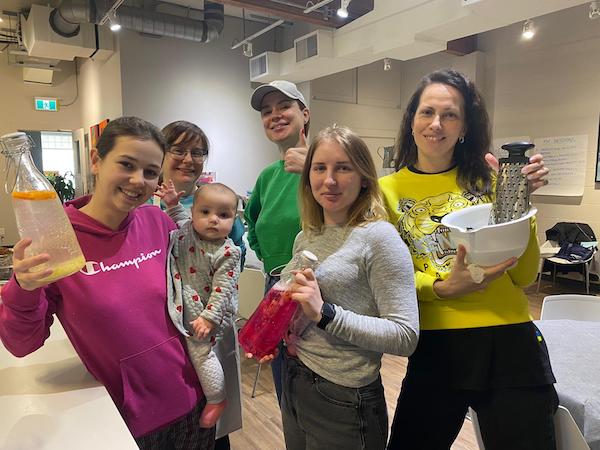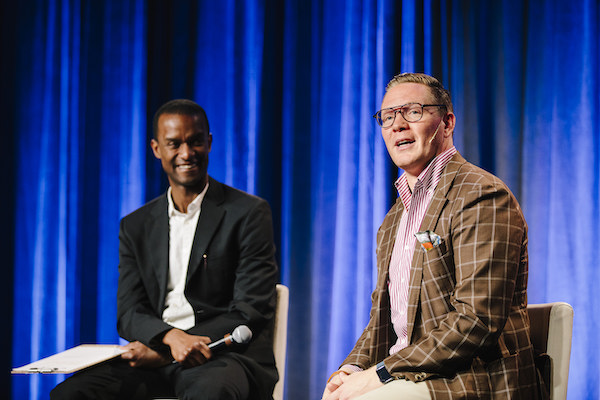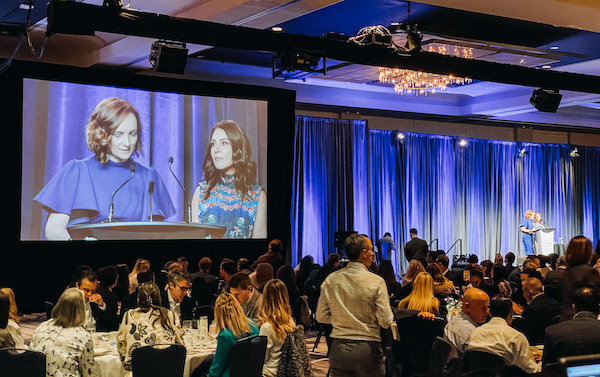Aviva Rathbone, chair of JQT Vancouver, finds hope in the fact that “[t]here are lots of people in the community coming together right now and finding connections to heal what they can in what is a very broken world and what is a very broken situation.” (photo from JQT)
Probably all Jews have experienced emotional and mental impacts from the events of Oct. 7 and since. For LGBTQ+ Jews, these effects are often magnified by the climates in their multiple communities.
JQT Vancouver (pronounced J-Cutie), a volunteer-run Jewish queer and trans nonprofit group whose mission is “‘queering’ Jewish spaces and ‘Jew-ifying’ queer spaces,” has released the results of a survey that indicates LGBTQ+ Jews are experiencing profound pain – regardless of where they stand on an apparently vastly diverse spectrum of opinions about the conflict in the Middle East.
Titled 2024 JQT Temperature Check Report, the document collates responses from 91 individuals, including narratives of their experiences, and the overview it paints is bleak.
“There are a lot of really sad commentaries,” Aviva Rathbone, chair of JQT, told the Independent. “A lot of the folks who responded to the survey are people who are really struggling right now.”
She cautioned that the survey may not include the perspectives of others who may be having more positive experiences.
“Some people are feeling really accepted into community right now, they are feeling like they found a place,” said Rathbone. “We didn’t hear from those folks, but that’s not to say that they don’t exist.”
The results are not surprising, she said.
“We knew people were struggling,” she said. “It was a surprise, I think, the depth of anger and sadness that was there.”
Fewer than half of survey respondents indicated that they felt safe and accepted in Jewish spaces and only about a quarter said they felt safe and accepted in queer spaces. Fewer still, 14%, said they felt comfortable in both.
Since Oct. 7, approximately half of respondents indicated that actions and/or statements of queer (57%) and Jewish organizations (51%) have had a negative impact on their mental health.
A majority (57%) of respondents indicated that their safety and security felt threatened since Oct. 7 because of their Jewish identity. More than two-thirds of respondents (68%) said they experienced antisemitism online or in-person since Oct. 7.
Much of the discomfort centres on divergent attitudes toward Israel and the war against Hamas, as well as opinions around the definitions of antisemitism and what some respondents describe as exclusivist attitudes in the Jewish community, often described as overwhelmingly pro-Israel, and in the LGBTQ+ community, described by many as unwelcoming to pro-Israel Jews.
One respondent said the Jewish community should “acknowledge that anti-Zionist Jews are still Jews and should be welcome in Jewish spaces” and that “queer Zionist Jews are still queer and should be welcome in queer spaces.”
JQT serves members who self-identify as Zionist and those who self-identify as anti-Zionist.
“When the mainstream Jewish community dismisses Jews who criticize Israeli actions, it makes me feel alienated from that community, more than before,” wrote one respondent.
Two among scores of examples illustrate the chasm between the narratives shared in the report. One respondent accuses “queers for Palestine” of trying “to turn Zionism into a dirty word” and making them feel “unwelcome as a Jewish Israeli in queer spaces when not hiding myself.” Another writer says, “It makes me unsafe when Jewish organizations […] make wildly racist statements about Palestine. Conflating Judaism with Israel makes it seem like I am complicit in this genocide.”
Said another respondent: “None of the synagogues or even [Jewish queer groups] have made any statements that humanize the struggle of non-Zionist Jews and how we’ve been systematically shut out of spiritual, social and cultural Jewish spaces for far too long. In fact, the current climate within these spaces promotes a pro-war and anti-Palestinian rhetoric that pushes me and my friends away from feeling security and belonging in our identities.”
The divergence in attitudes is typified by another survey response.
“People wearing an End the Occupation T-shirt or other such slogans signal to me that the wearers believe Hamas to be righteous rather than terrorist, that all lives are not equal, makes me uncomfortable, as does the aggressivity of protesters, including [queer groups that support] Palestine. Standing in solidarity with Israel and its absolute right to defend itself, while not recognizing the numbers of non-Hamas Palestinians killed and the living conditions in Gaza during the war is also not comfortable for me,” wrote a respondent.
If there is a clear takeaway from the study, Rathbone said, it can be summed up in one word.
“Empathy,” she said. “We have the ability to hold space for our own pain and anger and for other people’s pain and anger. I fully believe that humans are expansive and the Jewish community for sure is expansive and we have done this many times. We have been able to hold space for ourselves and for other people who are suffering, even when we don’t agree with them.”
Disagreements over politics, no matter how intensely and personally held, should not erase the empathy Jewish people have for one another, she said.
It is possible to have conversations across that divide, as JQT did recently in a “listen and be heard” event, facilitated by two professionals.
That event was part of a major mental health initiative in collaboration with Jewish Family Services, with funding from the Jewish Community Foundation of Greater Vancouver, that was in the works even before Oct. 7. Among numerous projects rolled out in recent months addressing the challenges facing LGBTQ+ Jews is a 10-page resource issued last week, titled JQT Affirming Care: A Toolkit for Mental Health Providers. It was developed by care providers Hannah Zalmanowitz and Anat Kerelstein.
Carmel Tanaka, executive director of JQT, said the toolkit, which Jewish trans or queer people can give to healthcare providers, as well as friends or anyone else who might benefit from a deeper understanding of their experiences, is a direct response to expressed needs in the community.
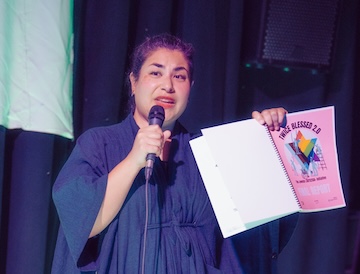
“We kept hearing that one of the barriers to receiving mental health support was linked directly to the lack of provider knowledge, training and competence around working with Jewish queer and trans people,” Tanaka said. “So, we created this educational toolkit aimed at reducing the burden on JQTs of having to educate their mental health providers on their lived experiences and mental health needs.”
Along with the Temperature Check report, Tanaka said, the toolkit provides tangible evidence of both the challenges and steps to improving the isolation and difficulties faced by affected individuals.
“I just really hope that leaders in the Jewish community, as well as leaders in the queer community, do take a moment to seriously read this so that they can better understand why we are doing this and why there is a need to support our community,” Tanaka said, adding that JQT continues to remain open to those who are on a spectrum of opinion on Israel and Palestine. “It really hurts to not be included in Pride events or in queer spaces, to not feel included in Jewish spaces. It’s an impossible situation to feel like you don’t belong.”
Even amid a plethora of discouraging responses, Rathbone said there is reason for hope.
“I don’t want folks to read it and to become really depressed and hopeless, because there are lots of ways to find hope,” she said. “There are lots of people in the community coming together right now and finding connections to heal what they can in what is a very broken world and what is a very broken situation. That also gives me hope, to watch people recognize that they can come together in community and do their part to heal something.”

